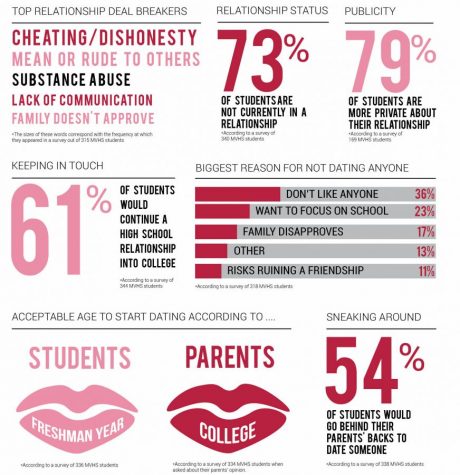Is this the end of young love?
February 1, 2020
Grease, High School Musical, 10 Things I Hate About You and Pretty in Pink—all these movies are the epitome of the perfect high school romance. To most people, high school relationships are a rite of passage–the first crush, the first date and the first kiss are an integral part of growing up. However, many teenagers today do not seem to be pursuing any more relationships.
In fact, those born between 1995 and 2012, dubbed the “i-Generation,” have been noticeably less interested in romance than their millennial predecessors, according to Jean Twenge, a psychology professor at San Diego State University. After surveying 11 million young people, she noticed that teenagers in their final year of school have been going out less frequently than thirteen year olds did as recently as 2009. Why is this?
According to Psychology Today, the progression from “liking” someone to actually going out on dates has transformed significantly ever since technological devices and social media appeared on the scene. Teenagers from this generation have grown up having smartphones on hand, meaning they spend far more time communicating with one another online than they do in person. As a result, they are not receiving the skill of face-to-face conversion and the self-esteem they need to help them go after that special someone.
 Not only that, but social media and peer pressure are also placing emphasis on “looking cool,” which may be prompting teenagers to worry even more about getting turned down or appearing silly if their feelings are not returned. Professor Twenge also notes that teenagers are pushing their crushes aside because they believe they will be ridiculed for making their feelings known or looking too clingy. Simply put, they do not want to be made fun of.
Not only that, but social media and peer pressure are also placing emphasis on “looking cool,” which may be prompting teenagers to worry even more about getting turned down or appearing silly if their feelings are not returned. Professor Twenge also notes that teenagers are pushing their crushes aside because they believe they will be ridiculed for making their feelings known or looking too clingy. Simply put, they do not want to be made fun of.
To add to the issue, one of the most complicated aspects of dating for teens is labels. In the twenty-first century, rarely anyone is considered “dating”–they are either just “talking” or a “thing.” The issue is that teenagers do not want to call their “relationship” something that it is not and scare off the other person. A lot seem to be intimidated by the commitment and having an open conversation with their significant other, which is key to having a successful relationship.
After all, it appears that the difficulty for teenagers is not the fact that they do not want to pursue a relationship, but rather they are unsure how to. Dating culture has evidently evolved into a vicious cycle of endless text messages and Snapchat streaks. Teenagers today hardly seem to go on dates and spend quality time with one another.































